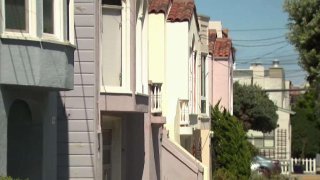
On the San Francisco ballot for Nov. 8 are two near-identical propositions promising to expedite affordable housing and adequately the city's housing crisis.
In September, the nonprofit San Francisco Housing Action Coalition challenged to remove one of the two measures, one submitted from the Board of Supervisors, from the ballot. A San Francisco Superior Court judge ruled that it's up to the voters to decide between the two competing housing initiatives.
Both state they are committed to streamlining the housing project approval process -- so what makes them different? Proposition E, proposed by Supervisor Connie Chan, promises to make housing project construction more effective by setting more requirements in terms of size, cost and construction type. Funding decisions will also be at the discretion of the Board of Supervisors - something proponents say will keep checks and balances in place to protect public dollars and focus on those needing housing the most.
Proposed projects must also have at least a 30 percent inclusionary requirement, meaning a large portion of its units have to be below the market rate and obtainable for low or middle-income residents.
Get a weekly recap of the latest San Francisco Bay Area housing news. Sign up for NBC Bay Area’s Housing Deconstructed newsletter.
Proposition E is backed by Supervisors Aaron Peskin, Dean Preston, Hillary Ronen and Gordon Mar, along with a group of unions and the San Francisco Democratic Party.
"Proposition E does not redefine affordability, ensuring that those who need affordable housing the most can access it," reads the proposition's argument text.
But opponents argue this strategy is not only financially challenging for developers, but adds even more red tape to breaking ground on housing developments that have already taken years historically.
A home builder in favor of the other measure, Proposition D, said that under the current affordable housing process, projects bottleneck. Plans become untenable and expensive due to arbitrary intervention, stemming from political or personal reasons that aren't "really valid," said Maureen Sedonaen, CEO of Habitat for Humanity Greater San Francisco.
The fight to get affordable housing projects up and running is becoming a crisis, one that this city cannot afford, Sedonaen said.
"I think we really need to work together to build the housing, come in compliance, to have every single unit that is in the pipeline be developed and move forward together to solve the housing crisis," Sedonaen said in a press conference.
Proposition D focuses on shortening the approval timeline for housing projects on public land that are 100 percent affordable, meant for educators or have at least 15 percent below-market-rate units. If passed, developers can bypass a seal of approval from the Board of Supervisors and have a definitive deadline on when the city's planning department can deem an application acceptable.
Among the supporters are Mayor London Breed, Sen. Scott Wiener, Nor Cal Carpenters Union and the Housing Action Coalition.
Wiener said that the city cannot afford to delay housing developments any longer. He noted how the city is currently under investigation by the state of California because in 2021 the board rejected a project that would have turned a Nordstrom parking lot at 469 Stevenson St. into 500 new housing units, called the the Stevenson Street project.
He referred to the incident as an "egregious, vile, multi-faceted violation of state housing law."
"This is going to speak volumes about whether San Francisco is serious about coming into compliance with state law, or whether San Francisco effectively needs to be placed into a land use receivership by the state, where San Francisco loses its local land use control, not to mention local or state affordable housing plans," Wiener said.
He said Prop E will only continue to allow the Board of Supervisors to arbitrarily kill projects. He referred to the initiative as a "Trojan horse designed to sabotage good housing policy."
Sujatha Srivastava, director for San Francisco Planning and Urban Research Association, a public policy organization that works on urban issues in the Bay Area, said that projects that already meet all city zoning codes and requirements are taking more than three years to get approved. This comes even after environmental reviews, area plan approval and community planning processes have already been completed. She said Proposition D could shorten the time frame.
"What we're doing here is just allowing those projects that already meet those requirements go from three years -- sometimes up to 10 years - go down to six months to be approved and to start construction," Srivastava said.
NorCal Carpenters Union, which represents 37,000 carpenters throughout the region, said it is supporting Proposition D because it raises the issue of improving labor standards in an industry that's predominately non-union and run by under-the-table pay.
Dan Calamuci, senior researcher for the union, said that Proposition E sets an "exclusionary labor standard" -- only "skilled and trained" workers can work on housing developments, which essentially means unionized workers. He said in an ideal world this is great, but San Francisco's residential construction industry simply does not have a big enough unionized workforce to meet its goal of 82,000 additional housing units by 2030.
"We would rather build up the existing workforce, bring them into our unions and not exclude anybody from being able to work on the desperately needed housing that the city needs," Calamuci said.
But opponents say Proposition D "eliminates public oversight," and is purposely trying to mislead voters. They also argue that the initiative serves the interests of developers, and does not have enough protection to make sure projects are affordable.
Proposition E enthusiasts submitted a complaint to District Attorney Brooke Jenkins for allegedly unlawfully using the official city and county seal, as well as the San Francisco Fire Department logo, in a campaign video.
"We ask that you immediately investigate the offensive and illegal campaign material and take action against those who have violated the provisions," reads a letter sent to Brooke in late September.
More information on the two propositions and other measures on San Francisco's ballot can be found at ections.sfgov.org/measures .




